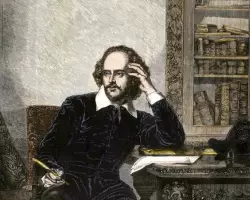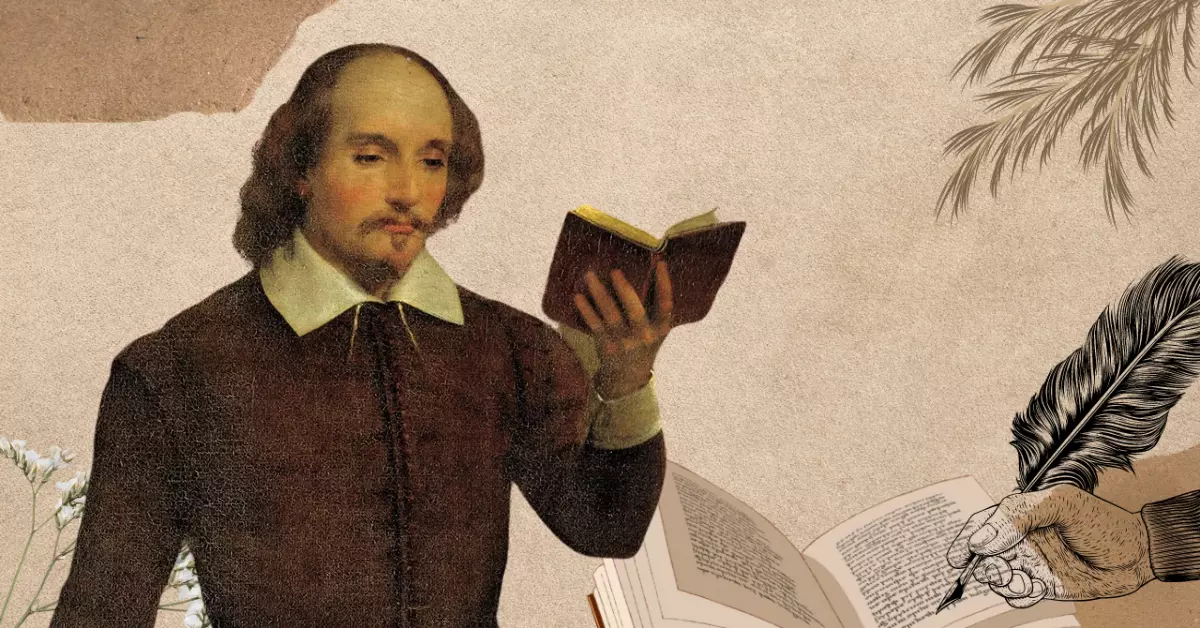When Was William Shakespeare Born?
William Shakespeare was born on April 23, 1564, in Stratford-upon-Avon, England. He was an English poet, playwright, and actor, considered by many as the most excellent writer in the English language.
Shakespeare includes 38 plays, 154 sonnets, and 2 long narrative poems. He is often called England’s national poet and nicknamed the “Bard of Avon.”

A brilliant writer named William Shakespeare who wrote amazing stories. In one tale, Romeo and Juliet, two young lovers, face great challenges. Another story was about Hamlet, a prince trying to solve a big mystery. There was also Othello, a hero with a tragic flaw, and Macbeth, who wanted power a bit too much.
King Lear told the tale of an old king learning life’s lessons. From “As You Like It,” Rosalind dressed up as a boy for a special mission. Puck, a playful fairy, caused chaos in “A Midsummer Night’s Dream”. Lastly, Prospero used magic to reunite with his family in “The Tempest.” Shakespeare’s characters took everyone on magical journeys.
Quick Fact About William Shakespeare
| Name: | William Shakespeare |
| Relationship Status: | Married |
| Nick Name: | The Bard of Avon |
| Date of Birth: | April 23, 1564 |
| Age: | 52 |
| Height: | 5′ 7″ |
| Wife: | Anne Hathaway |
| Son: | Hamnet Shakespeare |
| Daughter: | Judith Shakespeare & Susanna Hall |
| Net Worth: | £1.1 billion |
| Occupation: | Playwright, Poet, Actor |
| Citizenship: | United Kingdom |
| Death Date: | April 23, 1616 |
| Grave: | Holy Trinity Church, Stratford-upon-Avon, United Kingdom |
Table of Contents
Early Life and Family
William Shakespeare was the son of John Shakespeare, a successful glove maker, and Mary Arden, the daughter of a wealthy landowning farmer. William was the third of eight children, though his two elder siblings did not survive childhood.
Shakespeare likely attended the local grammar school, where he would have studied Latin authors like Ovid and Virgil. He did not participate in university, as was typical for middle-class Elizabethans of his time. At 18, he married Anne Hathaway, who was eight years his senior. They had three children together – Susanna, born in 1583, and the twins Hamnet and Judith, born in 1585. Hamnet sadly died at the age of 11.
Career in the Theater
Sometime in the late 1580s, Shakespeare moved to London to pursue a career in the theater. By 1592 he was well established as an actor and playwright, attacked at times by rival poets as an “upstart crow.” He produced the most known works between 1589 and 1613, though exact dates are difficult to confirm.
Shakespeare’s early plays were mainly comedies and histories. Works like A Midsummer Night’s Dream, The Taming of the Shrew, and the Henry VI trilogy cemented his reputation as a talented dramatist. His later tragedies like Hamlet, Othello, King Lear, and Macbeth are considered some of the finest works ever written in English.
The Globe Theater
In 1599 Shakespeare’s acting company, The Lord Chamberlain’s Men, built The Globe, an open-air theater that held up to 3000 spectators. Shakespeare produced many later plays at The Globe, including Julius Caesar, As You Like It, and Twelfth Night.
The Globe burnt down in 1613 during a performance of Henry VIII. It was rebuilt the following year, only to be closed in 1642 with the Puritan ban on theatre. A modern reconstruction of The Globe was built in 1997 near its original location and is a popular tourist attraction.
Shakespeare’s Time
English literature underwent a significant transformation when Shakespeare was born in the late 16th century. The Renaissance ushered in new ways of thinking, moving away from medieval norms. Writers like Edmund Spenser and Sir Philip Sidney had begun exploring sonnets while the first English theaters were coming into existence.
In this climate of artistic revolution, Shakespeare emerged as a leading figure. His plays and poems combined the classical knowledge he learned as a child with innovative poetic forms and narratives, leading to creations that stood out from his contemporaries.
Famous Books List
Certainly, William Shakespeare is renowned for his plays and sonnets. Here’s a list of some of his most famous plays, along with their approximate dates of composition:
- “Hamlet” (1600): This tragedy revolves around the young prince of Denmark who seeks revenge against his uncle, who has murdered Hamlet’s father, taken the throne, and married Hamlet’s mother.
- “Macbeth” (1606): In this tragedy, a Scottish general named Macbeth receives prophecies from three witches that he will become the King of Scotland one day.
- “Romeo and Juliet” (1595): A timeless tragedy about two young star-crossed lovers whose deaths ultimately reconcile their feuding families.
- “Othello” (1603): The tragedy of a Moorish general in the Venetian army tricked by his ensign into believing his wife has been unfaithful.
- “King Lear” (1606): A tragedy about an old king who descends into madness after disposing of his kingdom by giving bequests to two of his three daughters based on their flattery.
- “A Midsummer Night’s Dream” (1595): A comedic play that delves into the theme of love in various forms.
- “As You Like It” (1599): This comedy follows its heroine, Rosalind, as she flees persecution in her uncle’s court.
- “The Tempest” (1611): A play about the sorcerer Prospero who seeks to restore his daughter Miranda to her rightful place using illusion and skillful manipulation.
- “Julius Caesar” (1599): A tragedy about the political conspiracy that leads to the assassination of Julius Caesar.
- “Twelfth Night” (1601): A comedy about twins Viola and Sebastian who are separated in a shipwreck.
Shakespeare’s Impact on Modern English
The English language owes much to Shakespeare. He is credited with inventing or recording hundreds of words and phrases still in use today. Expressions like “break the ice,” “wild goose chase,” and “heart of gold” all trace their origins to the Bard.
He had an uncanny ability to capture the intricacies of human emotion, resulting in language rich in imagery and profound in meaning. His linguistic contributions benefit today’s writers, poets, and even everyday speakers. Every time we use phrases like “star-crossed lovers” or words like “lonely” and “gloomy,” we are, in a way, paying homage to Shakespeare’s lasting influence on the English language.
Read More: When Was Elvis Born?
Last Years
Around 1610 Shakespeare retired from public life and returned to Stratford-upon-Avon. He lived as a wealthy landowner until his death on April 23, 1616, just three days after his 52nd birthday. He was survived by his two daughters and wife, who died seven years later.
Shakespeare was buried at the Church of the Holy Trinity in Stratford. The stone plaque on his grave includes a famous curse against moving his bones, part of which reads: “Blessed be the man that spares these stones, And cursed be he that moves my bones.”
frequently Asked Questions
Conclusion:
William Shakespeare led a remarkable life, from modest beginnings to England’s most celebrated writer. His genius with language produced enduring characters like Hamlet, Macbeth, Romeo, and Juliet that still resonate today. Shakespeare’s breadth of imagination led to timeless themes about love, ambition, jealousy, and loss in his plays.
Centuries after his death, Shakespeare’s works continue to be performed, adapted, and analyzed worldwide. His literary legacy has enriched the English language and the craft of theater. As Ben Jonson said, the beauty and insight in his writings have made Shakespeare “not of an age, but for all time.” Even today, Shakespeare remains an awe-inspiring master playwright.







